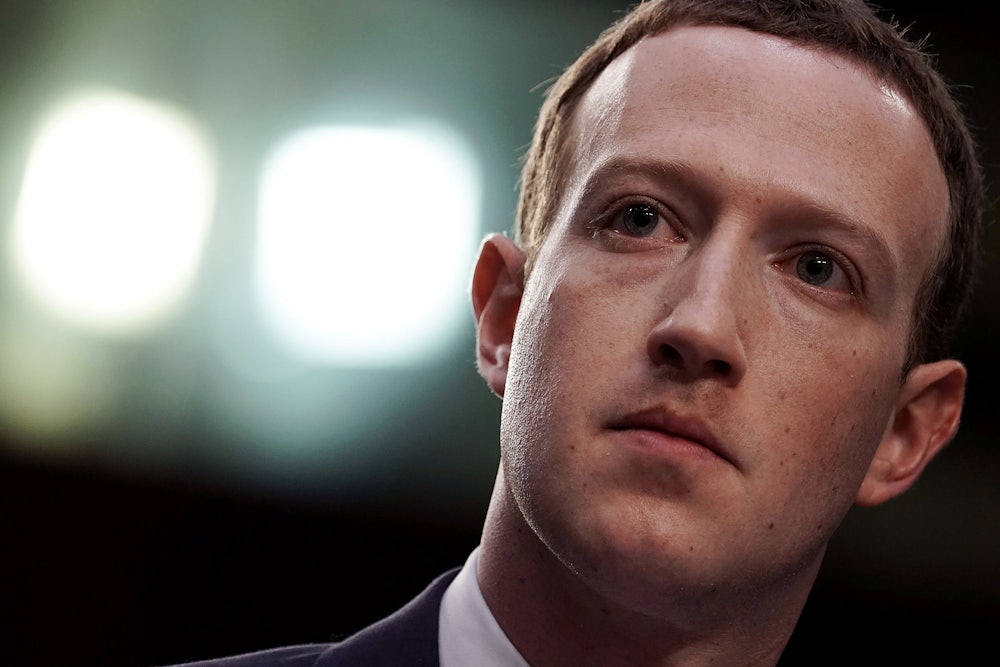Appearing before the Senate Judiciary Committee in April 2018, a contrite Mark Zuckerberg insisted that Facebook was still a force for good, as long as the company ensured that its tools were not used for nefarious purposes. “Facebook is an idealistic and optimistic company,” he said. “For most of our existence, we focused on all the good that connecting people can bring.… But it’s clear now that we didn’t do enough to prevent these tools from being used for harm as well.”
That was arguably Facebook’s lowest moment. Following the platform’s dubious role in the 2016 presidential election and the Cambridge Analytica scandal, Zuckerberg needed to appease an increasingly skeptical public and lawmakers keen on regulations that could cut into his company’s profits. He promised that it wouldn’t happen again and left Washington with little more than a slap on the wrist.
Appearing on Fox News on Thursday, Zuckerberg had a rather different message. There was little talk of Facebook as a company with distinct values, let alone a core ethical mission. As a debate raged over Twitter’s decision to fact-check and place a warning on tweets by President Trump, Zuckerberg made it clear that Facebook had no intention of interceding in political speech, no matter how vile or inaccurate. Chastising his competitor, Twitter CEO Jack Dorsey, Zuckerberg told Fox News, “I just believe strongly that Facebook shouldn’t be the arbiter of truth of everything that people say online.”
It was a wet kiss for Trump, quickly reciprocated both by press secretary Kayleigh McEnany and the president, who tweeted Zuckerberg’s statement as part of the White House’s larger campaign against Dorsey and Twitter. It was a milestone in Facebook’s increasing rightward tilt. Now Zuckerberg is casting himself as a free speech absolutist, seemingly in an attempt to woo Republicans and stave off regulation.
“Private companies probably shouldn’t be, especially these platform companies, shouldn’t be in the position” of fact-checking, Zuckerberg told Fox. The decision to appear on the network the president watches most often was no accident. Zuckerberg was telling Trump that he had little to fear from the social media behemoth, which has not edited or fact-checked Trump’s comments that mail-in balloting is rife with voter fraud, despite the fact that Facebook has a fact-checking policy regarding misinformation that leads to voter suppression. (Twitter fact-checked Trump’s tweets about voter fraud but has left other offensive tweets alone, including several in which Trump accused Morning Joe host Joe Scarborough of a murder he did not commit.)
Zuckerberg is privileging a supposed commitment to free speech over his company’s own policies. In the years after the 2016 election, Facebook made an effort to at least appear to take issues like election interference seriously. These policies were attempts to woo critical Democrats, just as many of Zuckerberg’s public statements—to say nothing of his private meetings with Tucker Carlson, Lindsey Graham, and Hugh Hewitt—are intended to woo Republicans. But Zuckerberg has since deprioritized his company’s efforts to restrict election interference and is ignoring the president’s voter suppression efforts.
It just so happens that this position helps Facebook’s business model the most. Carefully scrutinizing statements from public officials would be expensive; holding them accountable would also jeopardize relationships with the very politicians Facebook is spending millions of dollars to court in Washington. Zuckerberg, whose only real ambition seems to be to oversee the largest and most profitable company on the planet, is not interested in making Facebook less toxic if the cost is too high.
At the same time, Zuckerberg continues to cast Facebook in messianic terms. His insistence that it not be an “arbiter of truth” replaces the communal idealism of the company’s early years with something like Fox News’s cynical “fair and balanced” approach toward news. Never mind that Facebook acts as an “arbiter of truth” all the time, recently labeling 50 million posts relating to the coronavirus as being untrue. It also took down the “Plandemic” video that alleged that “wearing a mask can make you sick and could lead to imminent harm.”
It turns out that the insistence that Facebook was an “idealistic” company was always a smokescreen. A Wall Street Journal report published earlier this month found that Facebook employees, including Zuckerberg, are well aware that Facebook is a hotbed for disinformation and division, and that it increases radicalization among users. But nothing has been done. When presented with evidence that the company’s algorithms were fueling polarization, Zuckerberg “signaled he was losing interest in the effort to recalibrate the platform in the name of social good” and asked “that they not bring him something like that again.” It seems they haven’t.
Zuckerberg’s charm offensive ultimately didn’t work. Despite his attempt to curry favor with the president on Fox News, Facebook was still named in the executive order that aimed to limit legal protections that prevent social media companies from being sued over content that appears on their platforms. But we now know that Zuckerberg’s claims that he is working for social good and cohesion have always been an exercise in public relations—and now, he’s not even bothering with the illusion.
